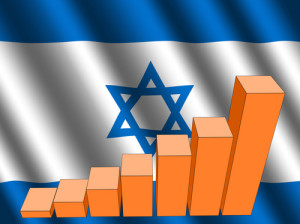Why do homes in Israel cost so much?
The price of homes in Israel begins with expensive land and high building costs. Some industry sources are saying the solution is bringing in additional foreign workers and introducing modern technology.
According to an analysis by the Association of Contractors and Builders in Israel, the biggest part of a home’s cost in Israel is construction, representing about 35% of the selling price. Then comes land and utility infrastructure, like water, sewage, electricity, which account for 30% of the final price, or even more in more desirable areas. Finally, the taxes account for an additional 22%.
The costs of construction include the direct expenses, which are materials (cement, steel, flooring, tubs and toilets, etc…) and labor. Then come the indirect costs, such as the builder’s operating expenses, which may include executive and staff salaries, legal, marketing and financing expenses.
Taxes, the cost of land and tax make the news on a regular basis, especially after Finance Minister Yair Lapid proposed his (now defunct) “0%-VAT” plan for first-time home buyers. Housing and Construction Minister Uri Ariel has a different plan to lower the cost of land to contractors. But the government has always regarded construction costs as something that it cannot control.
The result is that the other factors involved in home prices are under control, but wages aren’t. Oil and steel prices depend on global supply and demand; oil can affect inputs; but the cost of labor is simply elastic.
One of the plausible explanations for Israel’s high housing prices is the traditional monopoly Nesher has over the cement market. But a study by the Builders’ Association found that while increased competition in this sector would lower costs, it still wouldn’t really decrease home prices. The association also feels that it would help to increase the quotas on foreign construction workers.
Builders say that the key to lowering housing prices in Israel lies in importing more low-cost labor.
According to Benshimon, CEO of the Builders’ Association, the government allows 8,000 foreign workers to be in Israel at any given time, but there are only 5,000 at present. Importing foreign labor stopped when the government decided to limit the import of foreign workers to countries with which Israel has an agreement in place governing this business, which limits the point of origin to two places, Moldova and Bulgaria. But neither has sufficient skilled manpower in these areas.
And the shortage in skilled labor has had another cost: Building a home now takes 28 months on average, compared with 18 months in the 1990s, which bloats both the company’s overhead and financing costs.
The association estimates that building 42,000 new housing units, which is the Housing Ministry target, will require 20,000 foreign workers. To achieve the ambitious goal of building 60,000 new units a year, in order to make up the shortfall that accrued (as demand outstripped supply over years), will take 34,000.
Yigal Govrin, chairman of the construction project management company WXG (Waxman-Govrin-Geva) says it’s true that in addition to land being more expensive in desirable areas, so is construction, because the quality of the work is better. A relatively cheap home outside of town won’t be built as well as a more expensive one in greater Tel Aviv.
The more expensive the area, the better the quality buyers demand, he explains. Tel Aviv and environs are wealthier than the periphery. While the cost of building the skeleton frame is the same everywhere, that’s not the same for what goes into that skeleton, the finishing touches.
Those finishing touches, from the kitchen to the bathrooms to the building façade to the type of elevator, can run from 150,000 shekels per apartment to half a million and counting.
According to estimates by Prof. Yehiel Rosenfeld, head of the Construction Engineering and Management program at Haifa’s Technion Israel Institute of Technology, just the labor, from the cement pourers to the window installers, to painters and administrators, costs 2,000 shekels per square meter of finished housing. If one adds the cost of materials to that, from cement to steel to toilets or kitchen sinks, that too can come to say 2,000 shekels per square meter. When special equipment like cranes are added, the total construction cost comes up to 4,500 shekels per single square meter.
Rosenfeld notes that construction costs in Israel are actually reasonable relative to the world, even slightly lower, because abroad the materials are cheaper (a toilet in Israel costs more than a toilet in Europe, because it is imported from Europe). Labor, however, costs more in Europe than it does in Israel.



